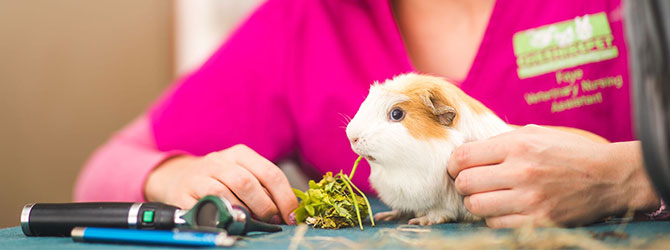Guinea pig health problems & how to take care of your guinea pig
Guinea pigs are relatively easy pets to look after, and can make a good introduction to animal care for younger members of the family. With the right care, most guinea pigs live for between four and seven years.
Guinea pigs are social animals so should be kept in pairs or same sex groups, but don’t keep them with Rabbits as they can be bullied and catch disease from them.
As long as you keep your guinea pigs well fed and watered, and in a comfortable, suitable cage, they don’t demand a lot of attention – but there are a few important health issues you should be aware of. Here are our tips to keep your small pet happy.
Caring for your guinea pig
It’s a good idea to get into the habit of checking your pet at least once a day so you can spot any problems early and get them treated by your vet – giving your guinea pig the best possible chance of staying happy and healthy.
Your guinea pig should have a shiny coat, clear, bright eyes, and a clean nose and mouth. A happy guinea pig will be active and playful – listlessness, limping, or matted fur could be signs that you should get him to the vet.
Any weight loss, or loss of appetite, can be signs that your guinea pig is at best unhappy, and at worst unhealthy, so get him checked out by your local vet.
Finally, your guinea pig’s bottom should be clean and dry. Keep a close eye out for any stickiness or mess, both of which can indicate diarrhoea or infection – and a sure sign that you need expert advice.
Signs of a healthy guinea pig
• Active and playful
• Clean nose and mouth
• Good appetite
• Yellow teeth
• Clean and dry bottom
“Your guinea pig’s teeth and nails grow continuously, so make sure you feed plenty of hay to help grind them down, they also enjoy scratching and chewing cardboard or wooden toys, to help keep them at a healthy length.”
Guinea pig health problems
Problems with teeth in guinea pigs
Your guinea pig’s teeth grow constantly throughout his life, so it’s vital to feed him a high-fibre diet to keep his teeth in check. Feed good quality hay such as timothy or meadow hay for healthy teeth and tummy’s. Providing wooden or cardboard toys that your pet can scratch and chew, can also help to keep those teeth – and nails – at a healthy length.
Dental problems can cause your guinea pig a lot of pain, and can make eating really tricky, so remember that prevention is better than cure.
Colds in guinea pigs
It’s wise to keep a safe distance from your pet if you have the snuffles, as guinea pigs can catch colds from humans. If your guinea pig shows any signs of a cold, such as a runny nose or sneezing, keep him warm and provide plenty of water. If the symptoms don’t clear within a couple of days, get him along to your local vet to rule out a more serious condition, such as pneumonia.
Vitamin C deficiency in guinea pigs
Vitamin C deficiency is a serious and relatively common condition in guinea pigs. The condition can cause a number of problems, including swollen joints and bleeding into the muscles and intestines. Symptoms include pain, weakness, diarrhoea, anorexia, and lethargy.
Vitamin C deficiency in guinea pigs can usually be avoided by feeding your pet a diet that’s high in vitamin C – such as fresh green leafy vegetables, bell peppers, broccoli, spinach, dandelions etc. Don’t feed citrus fruits. Avoid vitamin C supplements, which aren’t absorbed by the body in the same way.
Pests and parasites in guinea pigs
It’s quite possible for your guinea pig to contract fleas, lice and ringworm – particularly if there are other animals in your home, such as dogs and cats.
Constant scratching, excessive dandruff and patches of hair loss – particularly if accompanied by areas of red or sore skin – can be a sign that your guinea pig has mites. If you do suspect an infestation, disinfect his cage and equipment and speak to your vet for advice on treatment.
Ulcerative pododermatitis in guinea pigs
Guinea pigs have no fur to protect the bottom of their feet, and they can become sore and swollen as a result. Providing a thick layer of soft bedding, such as meadow hay, can help to prevent foot sores and ulceration – also known as ulcerative pododermatitis – and keep your pet’s tootsies in tip-top condition.
Need expert guinea pig care and advice?
For more tips on how to care for your guinea pig – or if you have any cause for concern about your pet’s health – contact your local vet.
Find your nearest vet using our Find a Vet page, or speak to a vet online using Online Vets.

